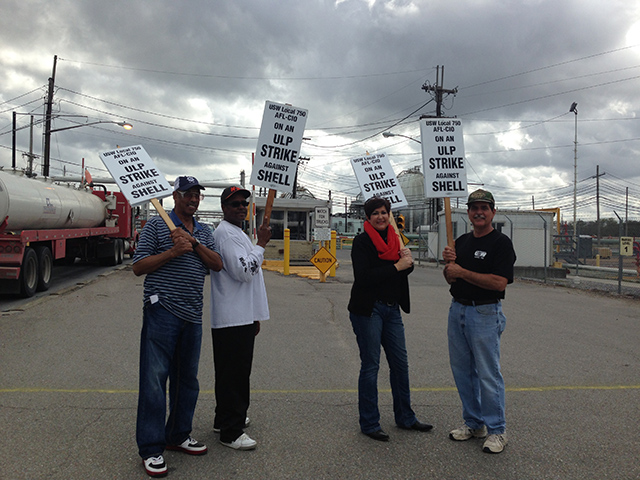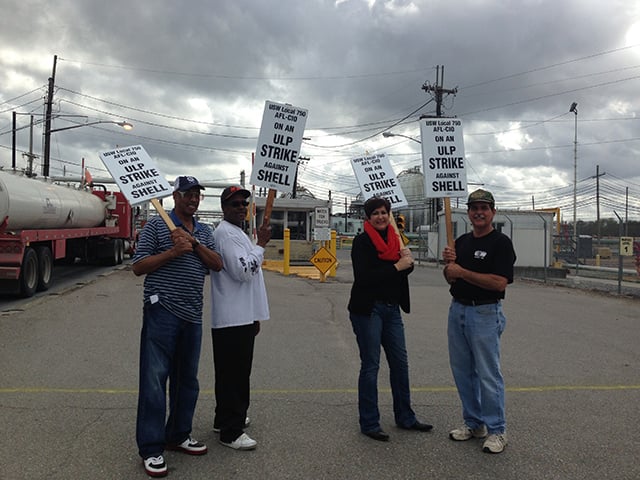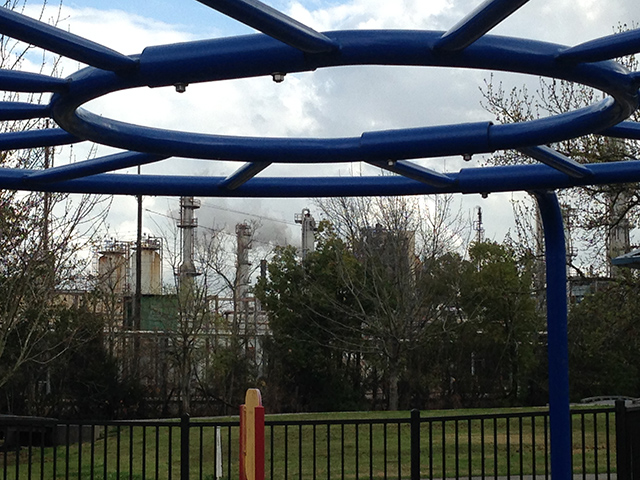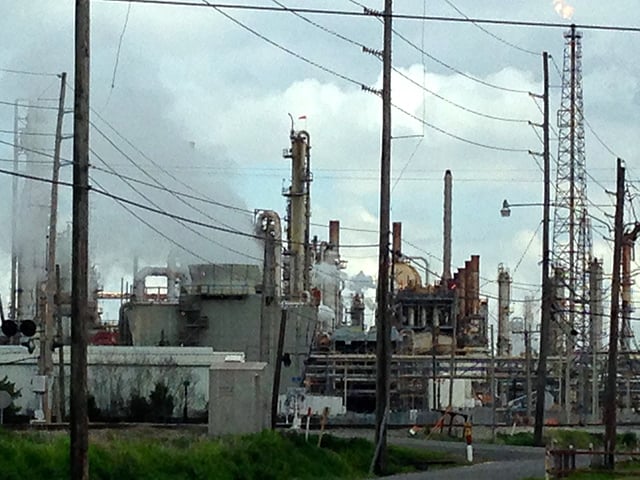

Norco, Louisiana, is a town of about 3,500 built around an oil refinery of the same name. A quiet neighborhood complete with a public park and a playground for children is tucked beside the western end of the massive petrochemical facility. Just beyond the trees on the fence line, plumes of steam gush into the air, and the flickering flame of a gas flare seems to lick the sky from the top of a towering stack.
A few blocks up the street, the striking refinery workers mingle in the United Steelworkers (USW) hall between shifts on the picket lines. Citing unfair labor practices leading to serious health and safety concerns, the union has held a nationwide work stoppage since contract negotiations with the industry, lead by Shell Oil, broke down in late January.
The workers at Norco – a joint venture of Shell and Saudi Aramco – and another nearby refinery joined the strike two weeks ago as negotiations continued to stall, and now an estimated 7,000 USW workers are striking at 15 facilities in seven states. Like the other refineries, the Norco plant is currently running on nonunion labor.
USW and Shell met on Wednesday and agreed to come back to the bargaining table next week. It’s the longest refinery strike the United States has seen in 30 years, and even as Shell and other employers continue to train workers to replace the strikers, the USW says its rank and file is determined to see it through.
Thousands of Accidents
“Our focus is on health and safety; it’s not wages at all,” said USW spokeswoman Lynne Hancock.
Thousands of accidents are reported at refineries across the country every year, but typically only make headlines when workers die or when plumes of pollution spew across neighboring communities. Such disasters have been occurring on a yearly basis.
The USW, which bargains on behalf of 30,000 workers at 65 refineries and hundreds of petrochemical facilities, blames working conditions and employment policies at refineries for the industry’s alarming safety record.
The union wants to put an end to unsafe staffing levels, long shifts that lead to fatigue, and the industry’s habit of replacing union workers with inexperienced contractors, among other injurious practices. When the industry balked at initial proposals in mid-February, the USW accused employers of being more interested in profits than safety.
“We shouldn’t be expected to work long hours for weeks on end without a break,” the union’s leadership wrote in a recent letter to its members. “We shouldn’t be expected to work in places where, on average, we have a fire every week of the year.”
Workers are not the only ones in danger. Accidents at refineries often involve the release of toxic pollution into communities like Norco, where the refinery averages 29 accidents per year and has released nearly 3 million pounds of pollution since 2005, according to the Louisiana Refinery Accident Database.
That point was punctuated on February 18, when an explosion at an Exxon Mobile refinery rocked Torrance, California, and sent clouds of irritating ash, filled with fiberglass and glass wool, into nearby residential neighborhoods. Four workers were injured, and the USW pointed to the incident as proof that safety concerns must be addressed.
The explosion wasn’t the first this year. In January, a fire and blast at Husky Energy’s crude oil refinery in Lima, Ohio, caused extensive damage and was heard across the city. Luckily, no injuries were reported.
The USW says that, every year for the past five years, five workers have died in incidents at US refineries, and nearby communities have been exposed to smoke and toxic chemicals. Using data from the Energy Department, the union estimates that an average of 43 fires at refineries are reported by the industry itself every year, along with thousands of other reported accidents.
“While employers have reaped billions of dollars in profits over the past several years, they have done little to improve conditions for workers and surrounding communities,” said USW President Leo W. Gerard, in a statement after the explosion in Torrance.
“It’s Smoky and It’s Hard to Breathe”

People living near refineries are also worried.
The Louisiana Bucket Brigade, an environmental watchdog group, operates the I-Witness Pollution database, which combines official accident reports from industrial facilities and pollution reports, called or texted in by everyday residents. On the I-Witness online map, the industrial corridor between Baton Rouge and the southern suburbs of New Orleans, which is home to Norco and a dozen other refineries and chemical plants, shows clusters of reports that appear on a daily basis.
Here are a couple of I-Witness reports filed from Norco on March 3:
“In Norco near 120 Apple St. at 5:53 p.m. on March 3. I smell something burning – it’s smoky and it’s hard to breathe in. Wind is blowing from the river towards my location. Not a pleasant smell.”
“I live at 241 Clayton St. [in Norco] and I believe it was Sunday of the strike – the flare was really high, it was bright orange . . . I was just concerned, you know. Basically, you can hear the flare, how high it was going up. The whole area lit up so you didn’t need a streetlight. Basically, there was a lot of smoke that look[ed] like it was sulfur, but it wasn’t a foggy night. Thank you.”
Some of the I-Witness reports can be verified by checking the database of accidents self-reported by the industry to state regulators or the federal government’s National Response Center (NRC).
An I-Witness report from January 8, for example, states that a large flare from the Norco plant was visible from an office building in New Orleans, about 30 miles away. At the same time, the Norco plant reported that a “processing unit experienced an upset due to cold weather” causing a flare and the release of ethylene, a pollutant that causes eye and skin irritation and has been linked to cancer.
The Norco refinery has reported eight other accidents so far this year, according to a Truthout review of NRC data.
Southern Louisiana provides a grim snapshot of how the refining business impacts local communities. Louisiana refineries reported 331 accidents to state officials in 2013 alone, an average of over six per week, according to the Bucket Brigade. These accidents released 62,000 gallons of liquid pollution and 2 million pounds of air pollution during the same year. That’s 100,000 times the amount of air pollution released when a car burns a gallon of gasoline.
Residents are rarely notified about accidents, and because the industry self-reports accidents to the government, the Bucket Brigade assumes that the pollution totals are probably underestimated.
Activists often knock on doors to get a better idea of how refinery pollution impacts the public.
In the first week of February, residents of Marrero, a city downriver from Norco that is home to a recycled oil refinery owned by Vertex Refining, made 17 reports of air pollution through I-Witness, including eight reports of health effects. One resident said air pollution triggered an asthma attack and kept them from leaving their house. The Bucket Brigade’s Emergency Response Team interviewed 44 Marrero residents, and found that all but one had recently smelled an odor, and nearly half reported health effects such as headaches and respiratory problems.
“One lady explained to me her fear and nervousness that she would get from smelling the gaseous odors, especially since she had children and had an elderly woman staying next to her,” wrote Bucket Brigade member Naja Battles after conducting the survey. “Another woman I spoke with had just got back from the hospital because she was concerned about how the pollutants were affecting her. She was beginning to feel a shortness of breath and strongly believed it was because of Vertex.”
Environmentalists Back USW Strikers

Environmentalists blame working conditions and lack of government oversight for these accidents – not the union workers – and green groups recently joined striking USW workers on the picket line to show their support.
“Shell is being shortsighted in its zeal to eke out maximum quarterly and annual profits at the expense of worker salaries and benefits,” said Anne Rolfes, the Bucket Brigades’ founding director, when environmentalists joined striking workers in Norco last week. “The result is more accidents, more dangerous accidents and a risk to the workers and the people who live nearby.”
As the industry’s lead negotiator, Shell contends that the sticking point in the contract negotiations is not safety, fatigue, health care or even wages.
“The central issue is the USW’s demand that Shell replace routine maintenance contractors with USW-represented employees,” Shell said in a statement last week.
Shell wants to retain “hiring flexibility” and its ability to hire nonunion contractors to keep facilities running “safely, efficiently and reliably.”
The USW, however, wants the chance to represent outside contractors and argues that dangerous accidents occur when refineries put profits and output before safety, and overwork the regular workforce while bringing in inadequately trained contractors to the fill the gaps.
Talks are expected to resume on Monday in Houston.
We have 9 days to raise $50,000 — we’re counting on your support!
For those who care about justice, liberation and even the very survival of our species, we must remember our power to take action.
We won’t pretend it’s the only thing you can or should do, but one small step is to pitch in to support Truthout — as one of the last remaining truly independent, nonprofit, reader-funded news platforms, your gift will help keep the facts flowing freely.